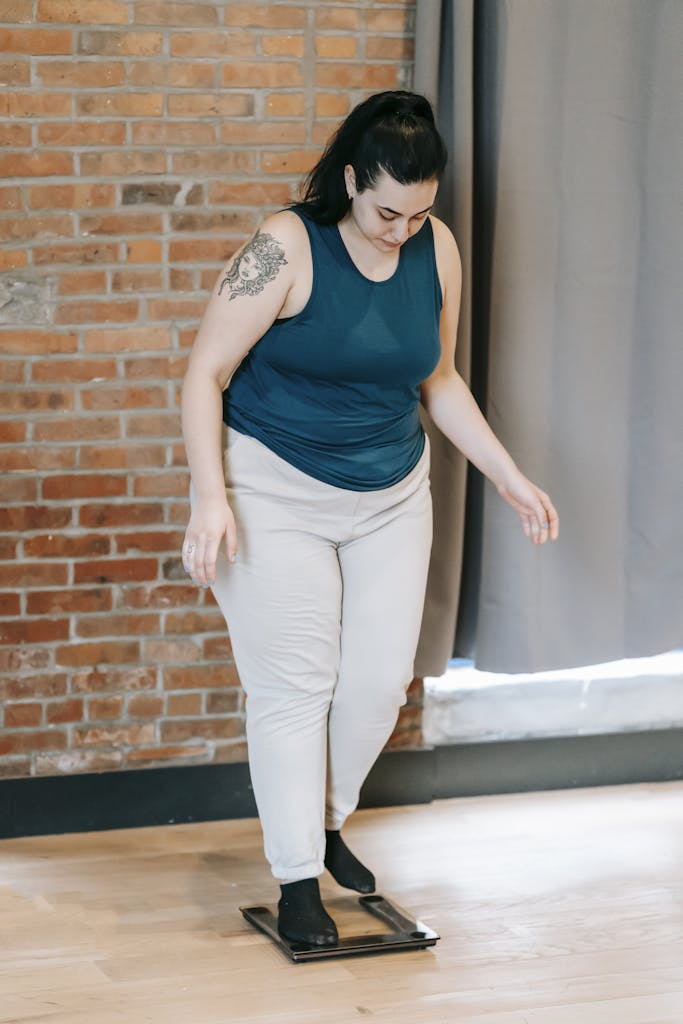Discouraged?
Feeling discouraged on Zepbound, Mounjaro, Wegovy, or Ozempic?
If you landed on this page, it means you’re feeling down or discouraged today. Before I say anything else, take a deep breath. Quiet your mind and take a moment to embrace the virtual support I’m sending your way.
You’re not alone in how you feel and you have a right to feel the way you do. But don’t stay in that dark place for too long. That won’t serve any positive purpose.
Instead, remind yourself that you won’t always feel this way. In fact, there are days ahead when you will feel happy, healthy, and in full control of your life. That’s what’s in store for you because you’ve decided to focus on your long-term health and part of that means losing weight.
So many different factors and emotions attach themselves to weight loss and many of these things can cause heavy feelings.
Let’s talk through a few reasons that might have sparked today’s moment of distress and how you can manage them.

Find the support you need
Maybe you haven’t started your weight loss journey yet, or you are only months into what will be a multi-year process. Do you have the support you need from your doctor, your employer, and your family and friends? This can be a long road. It helps if the right people in your life are on board.
Your doctors
I am amazed when I talk with readers and they report that their primary care doctors gave them no information about Zepbound or Wegovy or whatever weight loss drug they have been prescribed.
At a minimum, you need the following information:
- An explainer of how GLP-I and/or GIP drugs work.
- Information about the potential risks of the medication.
- Assistance in setting realistic weight loss goals.
- Personalized nutritional requirements.
- Advice on how to deal with potential side effects.
- Information about exercises that are safe for you.
If you don’t feel your primary care provider has given you enough information about these weight loss injection medications, consider finding an endocrinologist or weight loss specialist in your area or trying one of the reputable telehealth providers.
I live in a rural area and while my doctor is wonderful, she and her staff have their hands full caring for the community. She wasn’t as knowledgeable about Zepbound as I had hoped, so I joined Weight Watchers Clinic powered by Sequence, a telehealth provider.

I was thrilled to be matched with an endocrinologist based in Miami. She’s actually authored papers about GLP-1 drugs and shares her knowledge on TikTok and Instagram. With Weight Watchers Clinic, I also have access to a care liaison, an insurance concierge, a registered dietician, and a fitness coach plus all sorts of educational materials, workouts, an app, and fitness routines. For me, this was absolutely the right way to begin my Zepbound treatment.

Your family
We’d all love to think that our family and friends will provide the maximum support for any decision we make in life. And, most try. However, there are many misconceptions about obesity, which as of 2013, the American Medical Association classifies as a complex, chronic disease that requires medical attention.
There’s also a general lack of knowledge about these new GLP-1/GIP weight loss injection medications. Even someone who is normally incredibly supportive may disappoint you with a barrage of questions that sow seeds of doubt in your mind.
Just ask me about my conversation with my husband on the day of my first Zepbound shot. After seeing the amount of lean meat on my dinner plate, he continually questioned how much protein a registered dietician advised me to eat each day. He thought it was way too much or that I had gotten the number wrong.
It was a supremely annoying discussion in which I did not feel supported. It felt like he didn’t trust me to act on sound medical advice. I felt shamed into not eating the recommended amount of protein on that day and that was a mistake.
Don’t let someone else who hasn’t done the research try to tell you you must be wrong. If you’ve done your due diligence and have a plan devised by your doctor and dietician or nutritionist, trust that information.
My husband was trying to be a participant in my health care, but that’s not how it felt at the time. It would have been better if he’d independently researched to verify the information I shared before voicing his concerns about my doctor-led plan. He understands that now and has taken the time to read through all the clinical studies for Zepbound and Wegovy and that information has better equipped him to be supportive during my treatment.
If you have someone like this in your life, educate them on the reasons you’ve made this choice and hope the details you provide help them support you more fully. If it doesn’t, focus on the people in your life that do understand and want to help you become a healthier person.
Your employer
When it comes to your employer and the health insurance plan you’re enrolled in, cross your fingers that it includes coverage for weight loss medications — even if that means you and your doctor need to jump through prior authorization hoops. I’ll talk more about PAs in a second.
Related article: What is a prior authorization (PA)?
Medications like Zepbound and Wegovy retail for more than $1,000 per month and while a savings card from the pharmaceutical companies will cut that cost just about in half, that’s still a lot of money. Some commercial insurance plans will cover this medication with a more affordable copay (from $25 to $100 per month), although sometimes you may need to pay out of pocket until you’ve met your annual deductible.
If your insurance doesn’t yet cover GLP-1/GIP medications, all hope is not lost. In future blog posts, I’ll talk about how to lobby your employer’s benefits manager to change that and how to use a Flexible Spending Account (FSA) or Health Savings Account (HSA) to pay for your medication with untaxed earnings.

Push past insurance/PA roadblocks
The prior authorization (PA) process is another roadblock for many people hoping to start a GLP-1/GIP weight loss injection medication. Since these drugs, especially Zepbound, are new and expensive, most insurance companies require a PA where your doctor must explain why you need this particular drug.
Some insurers also require evidence — sometimes referred to as step therapy — that you’ve tried to solve this health issue previously. For example, step therapy would be your participation in a weight loss program or medications you’ve taken in the past to treat obesity.
The point of the PA is for your doctor to explain why the medication is medically necessary and why other options are not the best choice for you at this time.
Your doctor will include information in the PA, such as your weight and body mass index (BMI), as well as other conditions, such as Type 2 diabetes or insulin resistance. If you’ve been treated for obesity in the past, that will be outlined as well.
Then, doctors at your insurance company will review the PA and either approve it (yay!), request more information that might have been left out of the paperwork, or reject the request.

Note that the drug first has to be on your insurer’s “formulary.” That’s a list of medications approved for consideration. When a new drug like Zepbound is released, it takes time for all insurance companies to add it to their formulary.
Zepbound was released in December 2023 and as of February 8, 2024, it’s still not on some insurers’ lists of approved medications. If your PA is turned down for that reason, you may need to wait until Zepbound is added to the official list and then try again.
Some people have shared horror stories about the PA process. However, my experience was very smooth. I met with my endocrinologist at 11 a.m. on the day she prescribed Zepbound. Since I see her through Sequence telehealth, she sent my information to their insurance concierge, who worked on the PA and sent it to Express Scripts (my pharmacy benefits manager) on my behalf. I received my PA approval by 2 p.m. on the same day.
I attribute the fast turnaround to a few things: My BMI was over 50. My history showed a clear medical need for Zepbound. I had pages of step therapy evidence dating from 1993 to the present, and I had a doctor who knew exactly what the PA required and an insurance concierge who understood the system and could work within it quickly and efficiently.
My experience is a best-case scenario, but even if your first PA is rejected, don’t lose hope. The insurance company is required to explain why the request was rejected, and you can appeal. It’s common for a weight-loss injection medication request to be approved upon appeal.
Don’t give up hope! Just remind yourself that this part of the process may try your patience!
Don’t fear change
Fear is another factor that may be playing into your mood today. You may be afraid that you won’t reach your goal, but you could be equally leery of achieving it. Change, in a good or bad direction, can be scary, but it doesn’t have to be.
At Shots to Shed Pounds, we’ll break down the components of your fear so you can better manage it. For example, if you’re afraid you won’t reach your weight loss goal, we’ll reduce that feeling down to its core.
What exactly is causing that fear?
Whatever sparks your apprehension, we’re here to provide honest and accurate information and support that will hopefully erase any misgivings you have so you may focus on your personal plan to get healthier every day.
Don’t worry if the scale didn’t move today – or for a week
We’ve all been there: You took your weekly shot and managed any side effects. You stayed on your meal plan and were especially proud of hitting your daily protein and fiber goals. You drank ALL the water. You even managed to exercise multiple times this week. You are owning this!
And then you step on the scale and — whomp! whomp! — your weight hasn’t changed or, even worse, it’s ticked up a bit. I get it. That feeling of disappointment can be overwhelming and disheartening.
I’ll say two things about this scenario: First of all, your scale doesn’t care what day of the week it is. Maybe it’s weigh-in day, but you have to wake up early and get to work. You hop on the scale before you’ve done your morning “constitutional” on the porcelain throne.
Maybe this is TMI for some people, but if you had moved your bowels before your weigh-in, the reading might have been different (or not).

Is it that time of month? That will also mask your actual weight with some water retention. Did you eat something salty yesterday? That could have also caused some water retention.
Are you focused on a weight training program? Could you be gaining muscle as you’re losing fat and that accounts for no movement on the scale?
Don’t get crazy if the numbers on the scale aren’t what you expected/hoped. It’s a fleeting snapshot in time, and the next snapshot could be very different.
Second, and this is so important, weight loss is a long game — especially if your goal is to lose 50, 75, 100, or more pounds. That takes time. We all know that intellectually, but it can be difficult to keep that in sight on a day-to-day basis.
It’s taken some of us years (more than 50 in my case) to get to our current weight. It will — and should — take time to lose that weight safely. According to the NIH’s National Heart, Lung and Blood Institute, it’s safe to lose one to two pounds per week.
Mayo Clinic says in order to hit that weekly goal, you’ll need to burn 500 to 1,000 more calories than you consume daily. You can do that through a combination of a calorie-reduced meal plan and exercise.
It’s important to make peace with time and how it ebbs and flows. There will be days and weeks when the scale doesn’t reflect a change. However, that doesn’t mean your body isn’t experiencing other very positive changes that aren’t as readily seen as a number on a scale.
Talk with your doctor about your long-term plan to reach your weight-loss goal, so you have a clear idea of the timeline. Sometimes just knowing you’re on track can help lessen those feelings of discouragement.
So, what can you do to get out of the funk when things don’t seem to be going your way?
Focus on beyond-the-scale celebrations
Beyond-the-scale celebrations, also called non-scale victories (NSV), are pieces of evidence beyond a number on the scale that show you are becoming healthier every day.
Non-scale victories could include:
All of those things are benefits of weight loss. Take a victory lap when you reach those goals!

Give yourself grace and be proud

Finally, remember you’re in this for the long haul. There will be days where you feel fantastic and some where things don’t go the way you had hoped. That is OK. That’s how life is supposed to be! The challenging times make us appreciate the good days even more.
When you find yourself discouraged or sad or even angry, take a breath. Remind yourself that this is temporary. You’re on track. In those moments, be proud that you’re even trying. You understand the importance of this journey so you can become healthier every day.
Feel empowered by this choice, and don’t forget that you’re trending in the right direction — even if today was lousy.
Please visit the blog for more resources to help you tackle your weight loss plan as effectively as possible. And do me a favor: Shoot me an email to tell me what you’re struggling with right now.
Here’s to all your happy and healthy days ahead! —Andrea
